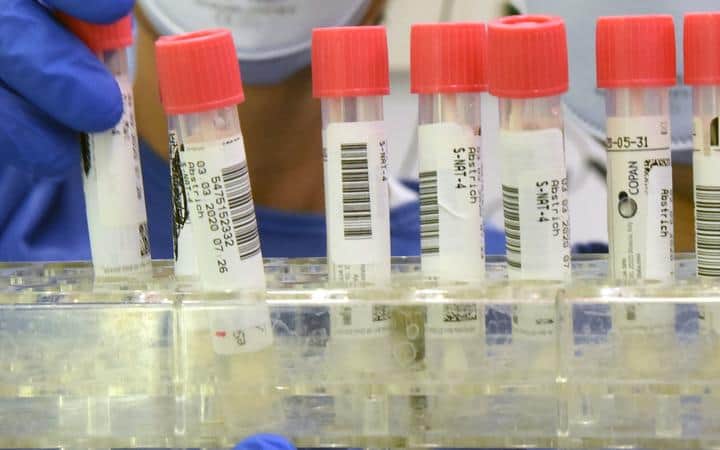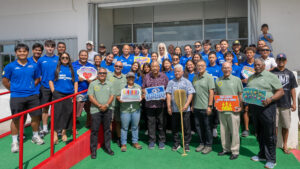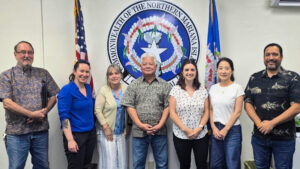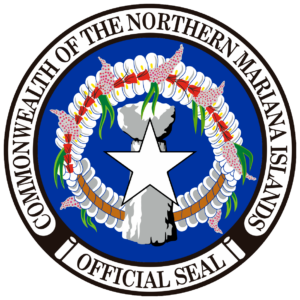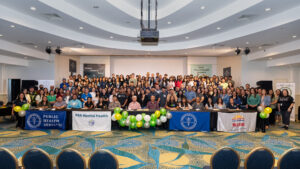Individuals can now register at www.governor.gov.mp/covid-19/testing and access results at www.cnmicovidresults.com
The Governor’s COVID-19 Task Force and Commonwealth Healthcare Corporation (CHCC) announce the reopening of the CNMI Community-Based Testing Initiative.
- COVID-19 testing reopened on Saipan and Tinian on Tuesday, July 14, 2020 and will reopen on Wednesday, July 15, 2020 on Rota. Spots are limited by location. Future testing dates will be updated and announced.
| Island | Date | Time | Location | Drive-Thru/Walk-up |
| Saipan | 7/18/2020 | 1:00PM-3:00PM | Kanoa Resort Saipan | Both |
| Tinian | 7/15/2020 7/16/2020 | 8:30AM – 11:00AM 8:30AM – 11:00AM 8:30AM – 11:00AM | Baseball Field Huangshun Laundromat 3 K’s Laundromat | Walk-up |
| Rota | 7/15/2020 7/16/2020 | 1:00PM-4:00PM | Rota Health Center | Walk-up |
- The Task Force optimized the Governor’s website to reflect the current testing schedule and locations as well as available slots. This information will be updated routinely.
- Specifically, at Kanoa Resort Saipan, there are workstations available at Station 3 for community members who have not registered. Please note that even though you register at Station 3, your testing date will be based on the next available slot.
- For businesses with 50 or more employees and for all government agencies, please call 287-0046 / 287-1089 / 287-0489 for information on group registrations.
- People who were previously tested through the Community-Based COVID-19 Testing Initiative are not able to register for testing at this time.
Steps for CNMI Community-Based COVID-19 Testing Initiative:
- People interested in being tested for COVID-19, can register online or by phone.
- The registration portal for all islands will be using the Governor’s COVID-19 Task Force site at www.governor.gov.mp/covid-19/testing. Or call 287-0046 / 287-1089 / 287-0489
- People who were previously tested through the Community-Based COVID-19 Testing Initiative are not able to register for testing at this time.
- Write down your Confirmation ID.
- Your Confirmation ID will be provided to you after you register. TIP: Your confirmation ID is unique to you. It cannot be shared or transferred.
- Please use an email address that you have access to when you register online. Your Confirmation ID will be sent to your email. TIP: Check your spam/junk folder
- If you want to register over the phone, your Confirmation ID will be given to you by a CHCC COVID-19 Info Line representative.
- Prepare for your appointment.
- Bring your Confirmation ID provided to you after registration. Your Confirmation ID is required at your appointment.
- Wear a face covering throughout the appointment
- Visit your testing site.
- Self-quarantine while you wait for your results.
- Wait at least 72 hours from the specimen collection appointment for your results.
- Register at www.cnmicovidresults.com
- Sign in and search for your result using your confirmation ID
- Save or print a hard copy of your results immediately. Results will only be available on this site for a timeframe of two weeks.
Community testing for COVID-19 is not mandatory. It is another surveillance tool to help the Task Force and CHCC detect and contain the SARS-COV2 virus, the virus that causes COVID-19, within the CNMI. Community testing may also help us understand how widespread the virus is in the community.
At this time, community testing for COVID-19 involves inserting a long swab (like a Q-tip) into the cavity between the nose and mouth. This might be more uncomfortable for some people. Getting tested for COVID-19 does not improve response to the illness, nor does it reduce the risk of contracting or transmitting the disease. Our goal is to provide results as quickly as possible within a reasonable time-frame. People who are tested and have a negative result are still vulnerable to the virus.
Community testing will help us to identify people who may be infected with the virus, especially those who may be pre-symptomatic or asymptomatic, so we can direct these people to the appropriate care, contain the virus, and prevent its spread using tools such as quarantine, isolation, and contact tracing.
Should you test positive for SARS-COV2, the virus which causes COVID-19, a CNMI Health Representative will meet with you to help you understand your infection risk. You’ll be ordered to isolate at the designated isolation site to protect others around you. You will be connected to affordable medical treatment if needed, regardless of income or immigration status.
Anyone you have been in close contact with can also access help if you’ve been exposed to the virus. Your information and the information of your close contacts will not be shared.
As a reminder, it is essential for everyone in the community to continue to practice good hand-hygiene, wear a face-covering, social distancing, and limit time spent in public places as much as possible.
Practice the 3 W’s – Wash your hands. Watch your distance. Wear a face covering.
- Wash your hands for at least 20 seconds with soap and water, avoid touching your face, cover coughs and sneezes with a tissue or your sleeve.
- Use an alcohol-based hand sanitizer if soap and water are not readily available.
- Practice social distancing, which means avoiding close contact with people in order to avoid catching the virus yourself and to avoid passing it on to others.
- Limit the size of your gatherings. The risk of COVID-19 spreading at events and gatherings increases as follows:
- Lowest risk: Virtual-only activities, events, and gatherings.
- More risk: Smaller outdoor and in-person gatherings in which individuals from different households remain spaced at least 6 feet apart, wear cloth face coverings, do not share objects, and come from the same local area (e.g., community, town, city, or county).
- Higher risk: Medium-sized in-person gatherings that are adapted to allow individuals to remain spaced at least 6 feet apart and with attendees coming from outside the local area.
- Highest risk: Large in-person gatherings where it is difficult for individuals to remain spaced at least 6 feet apart and attendees travel from outside the local area.
- Wear a face covering. For more information about DIY face coverings, please visit https://www.cdc.gov/coronavirus/2019-ncov/prevent-getting-sick/cloth-face-cover.html
- Be cautious when dining out and pick up food through drive-thru, take-out, or delivery options when possible.
- Plan your errand trips to limit the time spent in public, such as getting groceries or picking up medications. When returning home from an errand, wash your hands before doing anything else.
- Older adults and people with chronic medical conditions are at higher risk of getting very sick from this illness. People at high risk should stay at home as much as possible.
Know the signs and symptoms of COVID-19 and what to do if you become symptomatic:
- Stay home when you are sick and if you recently traveled to a place with COVID-19. Self-quarantine means:
- Avoid or limit visiting public places. Do not visit your place of work. You may leave to get necessary medical care, food, or other supplies if no one else in your household is able to fulfill these needs for you.
- Separate yourself from others in your home, especially if you are experiencing symptoms or if others in your home are not in quarantine. Limit visitors
- Stay in a separate room and use a separate bathroom if possible.
- We encourage you and people in your household to wear a face covering.
- Wash your hands often with soap and water for at least 20 seconds. If soap and water are not available, use an alcohol-based hand sanitizer.
- Clean and disinfect frequently touched objects and surfaces.
- Cover your coughs/sneezes with a tissue, then throw the tissue in the trash. If there is no tissue, use your sleeve. Not your hands!
- Practice social-distancing and wear a face-covering. If you need to go out, maintain at least 6 feet distance away from others. Avoiding touching your eyes, nose, and mouth with unwashed hands.
- Take your temperature and keep a log of any symptoms you might have. A fever is 100.4°F or 38°C
The Governor’s COVID-19 Task Force continues to manage COVID-19 inquiries and residents are encouraged to utilize this resource for additional information. The Governor’s COVID-19 Task Force numbers are 287-0046, 287-1089, or 287-0489. These numbers are available Monday to Friday from 7:30 am to 6:00 pm.
For mental health support and helpful tips during a crisis please call the Mental Health Support Line at 323-6560 or 323-6561 These numbers are available Monday to Friday 7:30AM-4:30PM. For the 24/7 Disaster Distress Helpline please call SAMSHA at 1-800-985-5990
For more information about DIY face coverings, please visit https://www.cdc.gov/coronavirus/2019-ncov/prevent-getting-sick/cloth-face-cover.html
For more information about CHCC programs, please follow CHCC on Facebook, Instagram, Twitter at @cnmichcc, check out our website at www.chcc.gov.mp or call us at (670) 234-8950.
For more information on the Governor’s COVID-19 Task Force, visit governor.gov.mp and please follow @GovernorCNMI on Facebook, Instagram, and Twitter.
Rumor Control – Stop the Spread of Misinformation
During crises like this, oftentimes the spread of misinformation is just as dangerous as the virus itself. The CNMI is reminded to only share official and verified notices, press releases, and advisories from the Governor’s COVID-19 Task Force and CHCC.
CHCC Point of Contact:
Lee Tenorio / Keanna Villagomez
(670) 234-8950 Ext. 3445
Governor’s COVID-19 Task Force Point of Contact:
Kevin Bautista
covid-19@gov.mp
# # #

